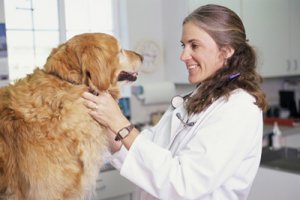Congratulations on adopting your new dog!
Adopting a new dog is an exciting, wonderful thing. But like all exciting, wonderful things, it comes with certain responsibilities, and keeping your canine companion in good health is at the top of the list. This responsibility begins the moment you adopt your dog, and the first thing you should do to make good on it is schedule an appointment with a veterinarian.
When to Schedule Your Appointment
Whether you’ve adopted a puppy or an older dog, it’s crucial that you have your new dog seen by a veterinarian as soon as possible.
Even if the shelter, humane society, rescue group, or private party from which you adopted your dog told you that it’s in good health and up-to-date on its vaccines, it’s still important that you bring your dog in for a visit within one month of its adoption date. Your dog was likely exposed to other animals since its exam, and the vaccines it received may not be complete for your geographic location and lifestyle. Therefore, it’s necessary to have your dog examined again so that we can fully assess its condition and needs and establish a firm foundation for its continued care.
What to Bring with You
When you come into our office for your first visit, you should bring the following with you:
- Medical and Vaccine Records. When you adopted your dog, the other party should have given you its medical and vaccine records. If they did not, please contact them to retrieve these records or have them mailed/faxed to our office prior to your dog’s appointment. We need these records to assess what treatments and vaccines your pet has already received and determine further action.
- Fecal Sample. Even if your dog tested negative for intestinal parasites and/or was dewormed prior to adoption, you should still bring a fecal sample with you to your first appointment. Again, it’s likely that your dog was exposed to other animals (and their feces) after the test/treatment, and it’s better to be safe than sorry.
What to Expect in the Exam Room
Some parts of your dog’s visit will be similar to what you encounter when you go to your doctor. We’ll weigh your dog, check its vital signs, and externally examine its body. Additionally, your veterinarian will review your dog’s medical/vaccine records and ask you a series of lifestyle questions to better understand what other treatments your dog may need.
Treatments discussed will likely include:
- Vaccines. Depending on where you live, whether your dog will be allowed outdoors, and its exposure to other animals, your veterinarian may recommend other vaccines in addition to those it has already received.
- Spaying or Neutering Your Dog. If your dog hasn’t been spayed or neutered yet, your veterinarian will explain the importance of this procedure, and our staff will help you set up an appointment.
- Heartworm Disease. Your veterinarian will explain the risks of heartworm disease and discuss preventative treatments.
- Infectious Disease Testing. There are numerous diseases that dogs can carry and pass to other animals, including humans. Based on your dog’s background, the results of its exam, and other factors, your veterinarian may recommend testing your dog for such diseases.
When to Come Back
At the end of your first visit, our staff will help you set up your next appointment(s). Don’t be surprised if we want to see you and your dog multiple times over the next few months. Newly adopted dogs usually require vaccines, tests, and other treatments, and we want to make sure your new pet gets the care it needs and deserves.
The veterinarians and staff at Animal Medical Center of Streetsboro look forward to meeting your new dog and providing it with premium care for many years to come. If you have any additional questions, please do not hesitate to contact us.

